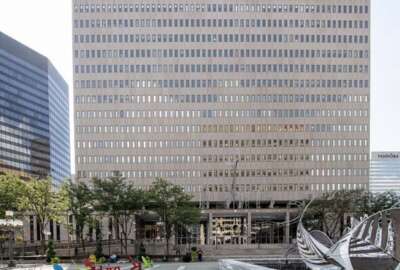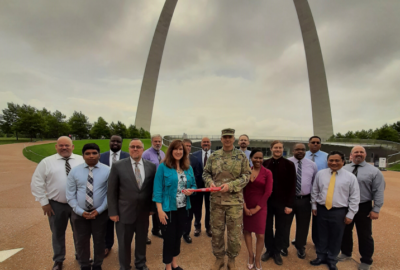Comfort food and kindness: The Southern Region’s FEBs
All across the South, Federal Executive Boards have a lot of work on their plate. Leaders from five of the eight southern FEB cities detail community-based...
From Feb. 12-16, Federal News Network will, day by day, dive into the details of each of the four Federal Executive Board regions currently operating across the U.S. On top of featuring the work and plans of each of the boards, we’ll take a closer look at the path that lies ahead for FEBs. Stay tuned for more!
Everything is bigger in Texas — including the federal workforce! With close to 110,000 feds statewide, Texas is the number one employer for federal employees working in the South, and home to three different Federal Executive Boards.
But there’s certainly plenty more happening from FEBs all across the Southern Region. Out of the eight Southern FEBs, leaders from five different cities highlighted the community-based volunteer efforts of federal employees — and of course, the delicious food you can find in any southern city.
Regional employee demographics:
Here’s who is working for the federal government in the South — and scroll down further to see what a few FEB leaders in different southern cities had to say:
The Southern Region’s FEBs:
Click an FEB link to travel down the page:
Atlanta
San Antonio
South Florida
Houston
Oklahoma
Note: Responses from FEBs have been edited for length and clarity.
The Peach State: Atlanta’s FEB
By: Darrell Graham, Atlanta FEB chairman | Return to the top
Why is your local FEB important to federal employees working in your region?
The Atlanta Federal Executive Board (AFEB) is extremely important because we service a diverse group of governmental employees, numbering well over 40,000. These public servants work in virtually all federal departments, agencies and corporations in carrying out various missions. The board is able to collaborate on our agencies’ goals, which sometimes results in these differing agencies providing better customer service experiences, responsive trainings, outreaches, and streamlined goods and services provided to our stakeholders. The employee professional training experiences alone allow us to interact with our colleagues who would ordinarily not interact with one another on a consistent basis. This allows us to use various organizational expertise in addressing myriad problems or issues that may arise throughout the year.
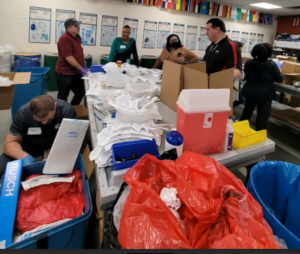
What does your local FEB hope to accomplish over the next year?
The AFEB has determined that fully implementing “FEB Forward” principles will be our top priority. As we seek to accomplish this vision, we remain steadfast in our efforts to ensure that we are meeting our stakeholders’ concerns. For example, we will be providing professional training and personal growth and development opportunities to employees at the mid-career level. Training federal employees is one of our paramount undertakings. This year, we have endeavored to assemble our annual Leadership Government Class of 2024 (LG ’24). As our flagship program, we have seen multiple graduates over the years building and honing their skill sets, which allows them an opportunity to maximize their potential for advancement throughout their federal careers here in the state of Georgia.
What makes your geographical region a unique place for federal employees to work?
The still-growing Atlanta metropolitan area is now the largest metropolitan area in the southeast region of the United States. In addition to the metropolitan area and the state of Georgia in general, the Atlanta area is home to the busiest airport in the world by passenger volume.
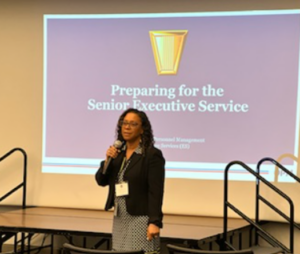
This requires extraordinary efforts by multiple federal entities such as the Federal Aviation Administration, the Department of Homeland Security, Customs and Border Protection, and other entities coordinating their efforts with state and local agencies to ensure the airport’s continued, uninterrupted operations. In addition, federal employees in the area are constantly traveling around the nation to conduct government business. Yet the state of Georgia as a whole has myriad industries that have some connection to the federal government from a regulatory and/or enforcement perspective. The area is home to multiple Fortune 500 companies, which include industries such as automobile manufacturing, agriculture, entertainment, consumer products, aviation, roads, bridges, waterways, defense, technology and hospitality, among many others. The federal government has a vital role in ensuring these companies are complying with various laws and regulations.
What do you wish people understood better about the impact of federal employees’ work in your area?

I wish non-federal workers and others fully recognized or appreciated the enormous reach of the federal government in delivering goods, services and products to the public in our geographical area. Whether we are discussing climate matters, employment, labor, technology, domestic security and other things that connect us, the federal government has a substantive role to play in ensuring that the American economy and our social, political and cultural institutions are being well served. We have agencies like the Department of Housing and Urban Development, National Park Service, Nuclear Regulatory Commission, Agriculture Department, Labor Department, Environmental Protection Agency, Centers for Disease Control and Prevention (CDC), State Department, FBI and Social Security Administration. These are just some of the agencies that are delivering goods and services to the American people that sometimes get elided over. In its simplest form, we sometimes forget how responsive the United States Postal Service is to the American public in carrying out its mission on a consistent basis.
What’s a must-try food or activity for anyone visiting the area, and why?
The one food any visitor to Atlanta must try is our lemon-pepper wings. To say they are a delicious treat would be an understatement. The unique flavor provides for an eating experience that can rarely be matched anywhere else in the country. I would also be remiss if I didn’t mention sweet tea. And after eating and enjoying this scrumptious meal and beverage, we have the Beltline which provides a wonderful opportunity to “walk off” some of those calories in and around Atlanta.
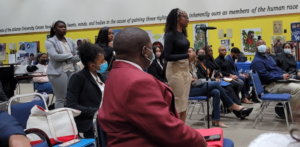
What are the benefits and challenges of your distance from D.C.?
One of the benefits from being almost 1,000 miles from Washington, D.C. is that the distance affords us an opportunity to have a different perspective on federal government operations. Federal employees in D.C. do a great job of being representatives of the government, but the overwhelming majority of federal employees work outside of the Washington area. Federal employees in D.C. represent no more than 15% of all federal workers. Being outside of the D.C. bubble also affords us the opportunity to be creative in our approach to interacting with external stakeholders without the “optics” of such collaboration being on the front page of various publications for varying reasons. One of the major challenges is knowing that the concentration of virtually all federal agencies’ operations are in Washington, D.C., and having to closely coordinate and monitor relevant transpiring events is pertinent to ensuring that the public perception of our activities are aligned properly with our leaders in D.C.
The Alamo City: San Antonio’s FEB
By: Zuleika Morales-Romero, The Alamo (San Antonio) FEB co-chairwoman | Return to the top
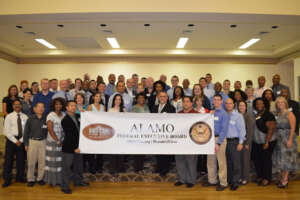
Why is your local FEB important to federal employees working in your region?
San Antonio is home to some 38,000 federal employees and a myriad of different agencies. The FEB is primarily a coordination entity, reinforcing federal partnerships, coordinating continuity of operations preparation and actions during disasters, sharing of impactful information between agencies, and acting as a conduit of training and standards for employees. The FEB also makes recommendations for office closures during extreme events. So the FEB is very pertinent to day-to-day activities as well as vital coordination during extreme circumstances to assist federal employees in their actions on behalf of the American people.
What makes your geographical region a unique place for federal employees to work?
San Antonio is Military City USA and federal employees not only support the general public, but there is a lot of attention built around serving our military families.
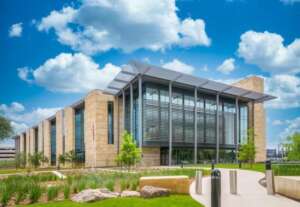
What do you wish people understood better about the impact of federal employees’ work in your area?
Most Americans are not fully cognizant of the impact federal employees and their agencies have on their day-to-day lives. But if they fly on a plane, if they drive on a major highway or live in a city of greater than 50,000 population, if they want to buy a home, if they need rental assistance or medical care, if they have been discriminated against, if they are homeless, if they need affordable housing or market rate housing, federal employees positively impact their daily lives. We in government do a good job of maintaining and working on the various missions and initiatives to the greatest extent possible and to the limits of our funding. We just don’t tell that story well.

What’s a must-try food or activity for anyone visiting the area, and why?
San Antonio Missions, a National Park Service site, and the only UNESCO World Heritage Site in Texas, is a must see. And of course, the well-known Riverwalk that attracts thousands of tourists a year. Regarding food, San Antonio is the home of Tex-Mex food and BBQ with a Tex-Mex flare.
What are the benefits and challenges of your distance from D.C.?
The perspectives of Washington and the field vary drastically from locality to locality. Employees in D.C. help advance new initiatives, coordinate our program activities, revise and tweak our regulations, develop new policies, and work with elected officials. But the field is all about where the rubber meets the road. We don’t primarily deal in theory down here, we are federal programs in action. That goes for almost every federal agency in the FEB — it’s policy versus action.
The Sunshine State: South Florida’s FEB
By: Agnes Winokur, South Florida FEB vice chairwoman | Return to the top
Why is your local FEB important to federal employees working in your region?
Historically, our local FEB has always been a very active FEB. We have the support of top leadership in our region’s federal agencies, which has enabled us to tap into the needs of the federal employees in our region and ultimately develop programs and activities to address those needs. For example, in 2023, our FEB held the “Stepping It Up” lunch-and-learn webinar for GS-7 to GS-10 federal workers to help identify their strengths and the skills needed for career growth. These types of webinars were requested by our federal employees themselves and over 75 employees attended.

Our FEB cares to make a difference in the lives of the federal employees in our community. We have many discussions and explore ways to positively impact our federal agencies. A perfect example is our High-Performance Leadership program. The cross-agency leadership activities are not only unique, but powerful in helping participants grow and expand their knowledge, which is evident by the many participants that have grown in their federal careers.
One of the most important roles that our FEB serves is during hurricane season. Being in Florida, we run the risk of being adversely affected by hurricanes every year. Our FEB has an emergency response committee that meets with the National Weather Service and Hurricane Center to discuss the hazards and dangers that storms may present. This information is quickly shared with the agency executives to assist decision-making and hurricane preparation efforts in their agencies.
What does your local FEB hope to accomplish over the next year?
2024 will be a transitional year for our FEB as we increase our territory from South Florida to covering all of Florida. While we do plan to maintain our very popular High-Performance Leadership program and our Federal Employee of the Year program, we are hoping to assess the needs of the federal workers in the other parts of Florida; partner and collaborate with the federal agencies in those areas; and bring new programming, training opportunities and other activities that help foster a united federal community.
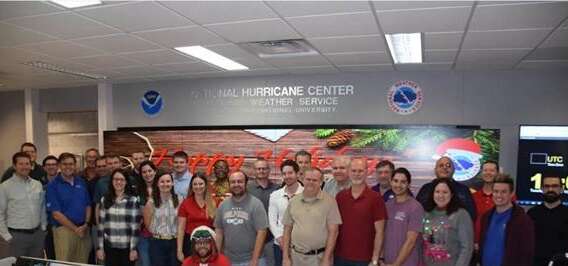
What makes your geographical region a unique place for federal employees to work?
Federal employees are spread throughout Florida, with areas often 8-10 hours of driving distance apart, which is a challenge at times to achieve engagement from everyone. However, we are also a highly diverse federal workforce eager to make a difference, and as such, full of energy. I think that’s why this FEB has always been so active. We are just stronger together. Our federal employees care deeply about our community and feel a responsibility to give back, which can be seen through their participation in the FEB’s Government Investment in Future Talent (GIFT) — English as a Second Language (ESOL) Outreach initiative. Federal workers go to schools and share their own personal stories with students to encourage them to keep learning English and to keep reaching for personal and professional success.
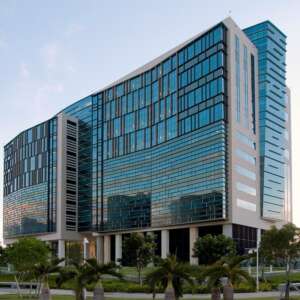
What do you wish people understood better about the impact of federal employees’ work in your area?
Florida has been seeing a significant increase in the cost of living, which ultimately affects federal agencies in their efforts to recruit new federal employees and retain existing ones. The Federal Executive Board offers us an avenue for federal agencies to come together and pool our resources to address these challenges in the federal workforce. We share information on career fairs and employment workshops, as well as collaborate on training exercises. For example, in fiscal 2023, our FEB teamed up with the Cybersecurity and Infrastructure Security Agency and the Federal Emergency Management Agency to facilitate training to federal agencies in how to handle cyber incidents.
What’s a must-try food or activity for anyone visiting the area, and why?
If you are in South Florida, you should definitely try any of the many ethnic food restaurants in Miami Beach. I would also recommend the beaches, boat rides — and maybe even a little salsa dancing.

What are the benefits and challenges of your distance from D.C.?
Many federal opportunities and activities happen in D.C., and if you do not work in the area, you don’t have those opportunities. There is a lot of information distributed in D.C. that may not get distributed across the country. This is an area where FEBs can really help unite the federal workforce by bringing the information, opportunities and activities to their own local regions. Florida is in the southernmost part away from D.C. However, our FEB still keeps us well-informed and still makes us feel that we are an important part of the federal government.
The Bayou City: Houston’s FEB
By: Julius Keys, Houston FEB program director | Return to the top
Why is your local FEB important to federal employees working in your region?
The Houston FEB is important because we represent approximately 31,000 federal employees and 107 agencies in the 22 counties along the upper Texas Gulf Coast area. The board is made up of agency heads or their designated representatives, all of whom are dedicated to being a constructive, unifying force within our community by providing effective communications and coordination between federal agencies across all levels of government.
What does your local FEB hope to accomplish over the next year?
In the next year, we hope to increase the effectiveness of the federal government in Houston by strengthening coordination of collaborative government activities. This includes establishing and maintaining critical communication networks in the event of local and national emergencies, providing targeted training opportunities for federal employees, serving as a hub for cross-agency coordination on local issues, and recognizing federal employees during Public Service Recognition Week.
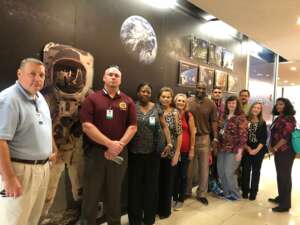
What makes your geographical region a unique place for federal employees to work?
Houston is a great place for federal employees to work because it offers warmer climate, a metropolitan area that provides various things to do in the city, and an affordable cost of living that allows federal employees to get more bang for their buck related to housing.
What do you wish people understood better about the impact of federal employees’ work in your area?
That federal employees are committed to their agency mission and always are willing to help!
What’s a must-try food or activity for anyone visiting the area, and why?
The Turkey Leg Hut, which offers gourmet turkey legs that are very popular.
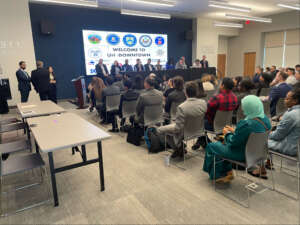

What are the benefits and challenges of your distance from D.C.?
The benefits are that we’re able to provide valuable information to federal employees flowing down from D.C., serve as a bridge to communicate, coordinate and amplify the president’s agenda in our region, and serve the federal community in a local area.
Some of the challenges involve access to agency headquarters personnel in D.C. to physically meet and carry out initiatives together, a lag time in getting the latest information flowing down from D.C., and access to critical information and resources in the D.C. area.
The Sooner State: Oklahoma’s FEB
By: Sharon Gordon-Ribeiro, Oklahoma FEB chairwoman | Return to the top
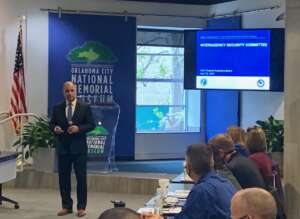
Why is your local FEB important to federal employees working in your region?
Oklahoma has 80,000 federal employees including military, postal service and an array of federal agencies. The FEB is primarily a coordination entity, reinforcing federal partnerships, coordinating continuity of operations, preparation and actions during disasters, sharing of impactful information between agencies, and acting as a conduit for training and standards for federal employees in Oklahoma. The FEB’s focus is to provide unified policy guidance in areas such as general management, public affairs and other substantive programs, the nature of which crosses department or agency lines and/or levels of government.
What does your local FEB hope to accomplish over the next year?
This year is considered a “transitioning” year. This is the first year that all FEBs are now under the leadership of the Office of Personnel Management. The Oklahoma FEB continues to operate with programs and speakers to accomplish three strategic goals: workforce building and succession management, cultivating an innovative organization, and fostering coalitions.
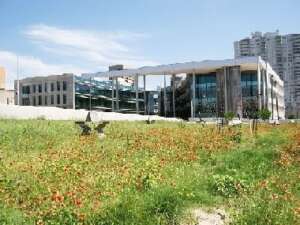
What makes your geographical region a unique place for federal employees to work?
Oklahoma is the 28th largest state with a population of 3.9 million. In terms of area, it is ranked 19th in the U.S. The 77 counties are made of diverse areas such as hills, mountains, plains and rural areas within the state. There are 38 recognized tribes in the state. American Indian and Alaska Native individuals make up 7.31% of the population.
What do you wish people understood better about the impact of federal employees’ work in your area?
For people to understand the impact, FEBs must become more visible in our communities. Federal workers and agencies must become more engaged with the public and the local community, and federal agencies must do a better job of telling their stories. FEBs must make efforts to recruit at colleges and universities’ campuses.
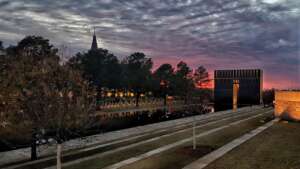
What’s a must-try food or activity for anyone visiting the area, and why?
Oklahomans have a love of the land and the food raised and grown on it. The state is rich with culinary heritage evident in local favorites like chicken-fried steak, Indian tacos, fried onion burgers and, of course, barbecue.
One of the popular sites is the Oklahoma National Memorial Museum and the entertainment district Bricktown. The Oklahoma City National Memorial and Museum was created to honor those who were killed, those who survived and those changed forever by the 1995 bombing of the Alfred P. Murrah Federal Building in Oklahoma City.
What are the benefits and challenges of your distance from D.C.?
There is only one direct flight to D.C. daily. Our greatest challenge is to ensure that our leadership in D.C. understands the operations of the field.
Copyright © 2025 Federal News Network. All rights reserved. This website is not intended for users located within the European Economic Area.
Drew Friedman is a workforce, pay and benefits reporter for Federal News Network.
Follow @dfriedmanWFED
Daisy Thornton is Federal News Network’s digital managing editor. In addition to her editing responsibilities, she covers federal management, workforce and technology issues. She is also the commentary editor; email her your letters to the editor and pitches for contributed bylines.
Follow @dthorntonWFED






